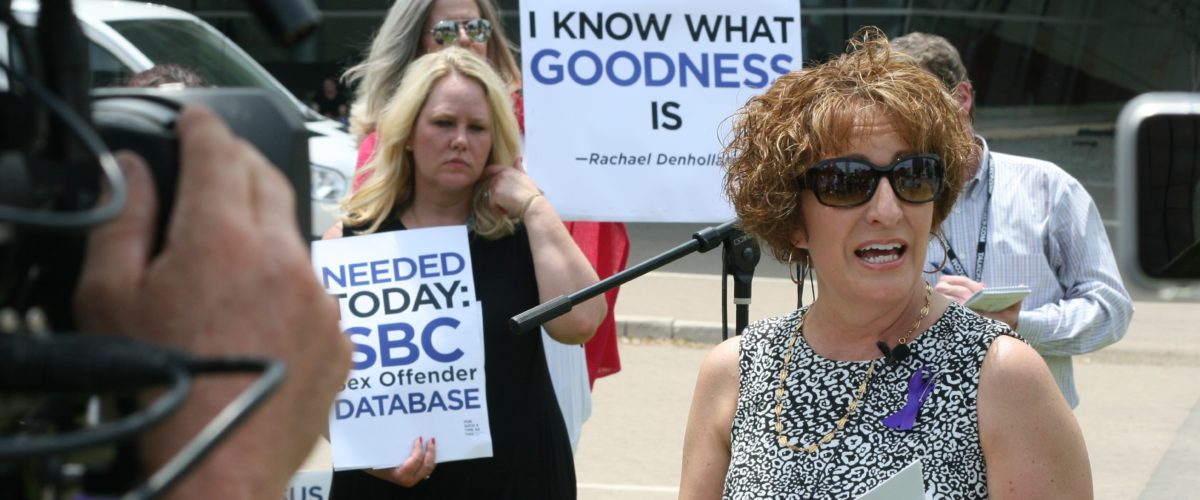The Southern Baptist Convention condemned both perpetrators and enablers of sexual and physical abuse in a resolution June 12 claiming belatedly to position the denomination on the side of victims.
“We deplore, apologize and ask forgiveness for failures to protect the abused, failures that have occurred in evangelical churches and ministries, including such failures within our own denomination,” said the final form of the resolution as amended from the floor.
The resolution comes on the heels of controversies including the firing of a seminary president for allegedly failing to report a rape and the first accuser of imprisoned former USA gymnastics doctor Larry Nassar telling a major Christian magazine that evangelical churches offer less support to victims of sexual abuse than the secular world.

Oklahoma pastor Wade Burleson speaks at “For Such a Time as This” rally.
Meanwhile, advocates for victims of domestic violence and child sexual abuse rallied outside the June 12-13 SBC annual meeting in Dallas, saying the time has come for women to be respected and honored in the nation’s second-largest faith group behind Roman Catholics.
“Southern Baptist pastors need to recognize that we have a responsibility to protect women and to protect children from men, particularly from ministers, who move toward them in sexual or physical abuse,” Wade Burleson, pastor of Emmanuel Baptist Church in Enid, Oklahoma, said in 90-degree heat outside the Kay Bailey Hutchison Dallas Convention Center.
Mary DeMuth, an author, speaker, blogger and abuse survivor, called attention to “a shameful exodus” of abuse survivors tired of being re-victimized when they turn for help to their local church.
“There is an unspoken and seldom articulated crisis within the SBC and the wider circles of the evangelical church,” said DeMuth, a former church planter in France. “In the sunset of the attractional church model, we have succeeded in wooing many through our front doors with relevant teaching, with powerful concert-like worship and a myriad of family friendly programs, yet our painful, untold story lies in a crowd of broken people who are flooding through our back doors.”
DeMuth said abuse survivors are leaving churches “because their brokenness is treated with contempt, inconvenience or dismissal” and because evangelicals “have preferred protecting our reputation over the cries of those who have been violated.”

Mary DeMuth
“Leaders within the evangelical community have scoffed at victims daring to tell their stories,” she said. “They have minimized abuse, using rhetoric that morphs it from felony to minor infraction. They have covered up abuse within their well-protected and powerful ranks. They have embarked on shame-based campaigns on anyone speaking out. have stood to their feet and applauded an abuser.”
“The Good Samaritans of the world outside our churches have provided far more help and empathy than the church has, and this should not be,” she lamented.
A separate resolution affirmed God’s call and gift to women in roles “within the biblical framework of complementary gender relationships.” According to the 2000 Baptist Faith and Message, that means women cannot be pastors and must graciously submit to their husband’s benevolent headship in marriage.
Burleson, one of few leaders publicly challenging the prevailing “complementarian” view of gender roles, said a faulty view of women’s equality is why it appears to some Bible-believing Southern Baptists that the secular #MeToo culture, not Scripture, is dictating how churches should treat women.
“The New Testament that we say we believe tells us that Jesus Christ sets women free to serve, to lead, to minister as he gifts them and empowers them,” Burleson said. “We are called by our heavenly Father to encourage and empower women in the same manner that we would encourage and empower men.”
“It seems to me that we’ve got a problem with the issue of authority,” he continued. “For some reason we think men have authority over everybody else.”
“When you take away this idea that men, particularly ministers, have authority over anybody, then you come to where Jesus is, to empower people in the way they are gifted by the Holy Spirit to serve in his kingdom,” Burleson said.
Earlier in the day, Burleson made a motion asking the SBC Ethics and Religious Liberty Commission to revisit the feasibility of establishing a sexual predator database shot down by convention leaders when he first surfaced the idea a decade ago.
The motion was referred to the ERLC, itself the focus of controversy. Messengers defeated an attempt to amend next year’s budget to defund the agency in retaliation for agency head Russell Moore’s criticism of evangelical supporters of President Donald Trump. Messengers also overturned a committee’s recommendation to replace a trustee eligible for a second term, allegedly because he is too supportive of the agency’s staff.
The rejected replacement, Kansas broadcaster Rich Bott, feuded with Moore in 2014 after the Baptist leader made an offhand comment criticizing negativity sometimes associated with Christian talk radio.


